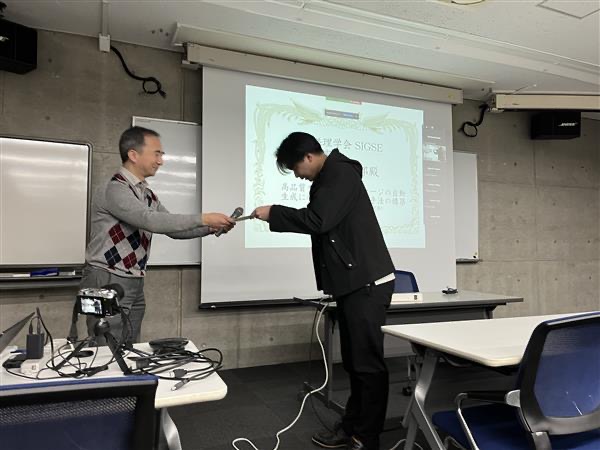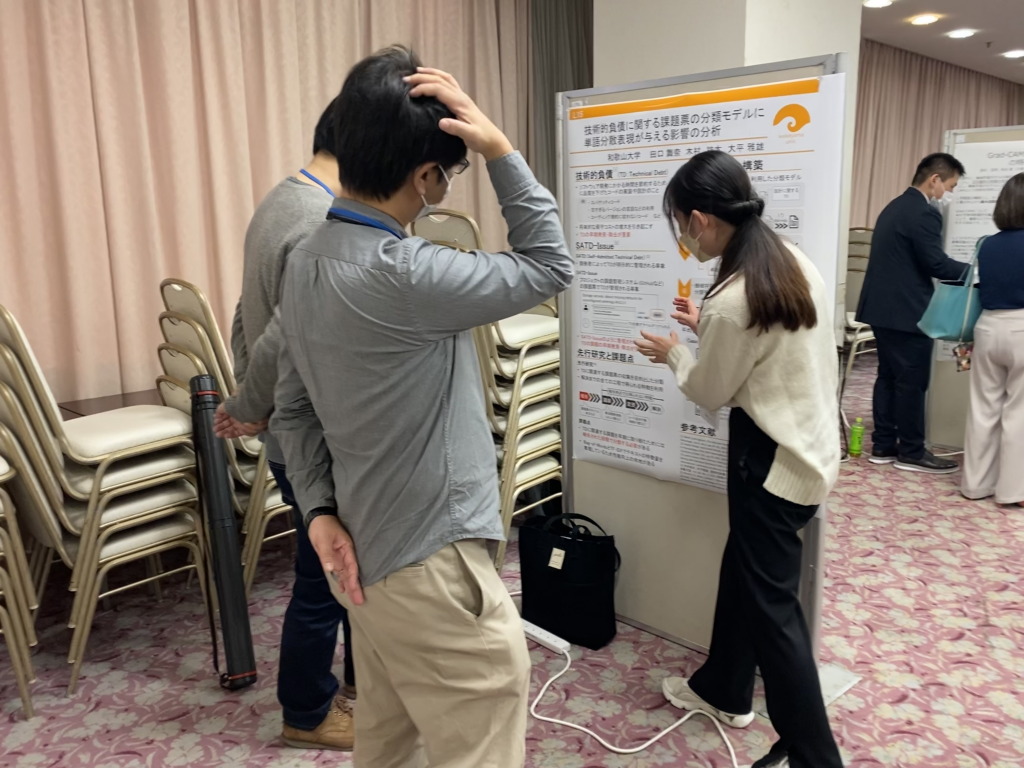第219回ソフトウェア工学研究発表会にて,研究発表をおこない,学生研究賞を受賞しました!
- 高品質なコミットメッセージの自動生成に向けたデータ収集手法の構築(山村慎太郎,大平 雅雄,木村 祐太)

以下の論文が情報処理学会論文誌2023年1月号に掲載されました!
@article{Kimura2023,
title = {技術的負債に関連する課題票分類手法の構築},
author = {木村 祐太 and 大平 雅雄},
journal = {情報処理学会論文誌},
volume = {64},
number = {1},
pages = {2-12},
month = {1},
year = {2023},
note = {http://doi.org/10.20729/00223403},
}
福知山公立大学の眞鍋先生との共同研究をまとめた以下の論文が情報処理学会Journal of Information Processing (JIP)へ掲載されました!
@article{Higashi2023,
title = {Automating License Rule Generation to Help Maintain Rule-based OSS License Identification Tools},
author = {Yunosuke Higashi and Masao Ohira and Yuki Manabe},
journal = {Journal of Information Processing},
volume = {31},
pages = {2-12},
month = {1},
year = {2023},
}
以下の論文が日本ソフトウェア科学会 学会誌「コンピュータソフトウェア」に掲載されました!
@article{Horiguchi2022,
title = {OSSプロジェクトへのオンボーディング支援のためのGood First Issue自動分類},
author = {堀口 日向 and 大平 雅雄 },
journal = {コンピュータソフトウェア},
volume = {39},
number = {4},
pages = {31-37},
month = {11},
year = {2022},
}
第29回ソフトウェア工学の基礎ワークショップ (FOSE2022)in 松江しんじ湖温泉 にて,2件のライブ論文発表をおこないました!

情報処理学会論文誌ジャーナルに掲載された論文「単語分散表現による類義語統一と単語N-gramによるフレーズ抽出に基づくセキュリティ要件分類手法(宮崎智己,東裕之輔,大平雅雄)」が特選論文として選定されました!
@article{Miyazaki2022,
title = {単語分散表現による類義語統一と単語{N-gram}によるフレーズ抽出に基づくセキュリティ要件分類手法},
author = {宮崎 智己 and 東 裕之輔 and 大平 雅雄},
journal = {情報処理学会論文誌},
volume = {63},
number = {1},
pages = {94--103},
month = {1},
year = {2022},
}
第28回ソフトウェア工学の基礎ワークショップ(FOSE2021)にて,1件のショートペーパー発表を行い,貢献賞を受賞しました!
On this page, we publish the dataset used in the our paper “Onboarding to Open Source Projects with Good First Issues: A Preliminary Analysis (Hyuga Horiguchi, Itsuki Omori and Masao Ohira)” has been accepted for inclusion in the Early Research Achievements (ERA) track of the 28th IEEE International Conference on Software Analysis, Evolution and Reengineering (SANER ’21).
The first file was used for the analysis of RQ1.
The violin plot in Fig. 1 shows the distribution of the prs_num in the 4th column of the file for each issue_type in the 3rd column.
The 1st column, dev_id is the ID to identify the developer. It is used to anonymize the account information of GitHub.
The 2nd column, issue_url is the URL of the issue resolved by the developer.
The 3rd column, issue_type shows whether the issue is a Regular Issue or a Good First Issue.
The 4th column, prs_num is the number of PRs that the developer with the dev_id has posted on GitHub before resolving the issue with the issue_url.
The second file was used for the analysis of RQ2.
Table II shows the 1st, 4th, and 7th columns of the file as shown below.
The 1st column, repo_url is the URL of the repository.
The 2nd column, issues_num is the number of Regular Issues that the repository has.
The 3rd column, resolved_issues_num is the number of resolved Regular Issues.
The 4th column, resolved_issues_percentage is the value of the resolved_issues_num (3rd column) divided by the issues_num (2nd column).
The 5th column, good_first_issues_num is the number of Good First Issues that the repository has.
The 6th column, resolved_good_first_issues_num is the number of resolved Good First Issues.
The 7th column, resolved_good_first_issues_percentage is the value of the resolved_good_first_issues_num (6th column) divided by the good_first_issues_num (5th column).
The 8th column, resolved_ratio is the ratio of the resolved_good_first_issues_percentage (7th column) divided by the resolved_issues_percentage (4th column).
The third file was used for the analysis of RQ3.
Table III shows the percentage of developers for each repository whose the prs_num(4th column) is 1 or higher among the Good First Issue of the issue_type(3rd column).
The 1st column, dev_id is the ID to identify the developer.
The 2nd column, issue_url is the URL of the issue resolved by the developer.
The 3rd column, issue_type shown whether the issue is a Regular Issue or a Good First Issue.
The 4th column, prs_num is the number of PRs that the developer with the dev_id has posted to the same repository as the issue_url after resolving the issue with the issue_url.
Hyuga Horiguchi (hhyuga201515xx@xxgmail.com)
Masao Ohira (masaoxx@xxwakayama-u.ac.jp)
Our paper “Onboarding to Open Source Projects with Good First Issues: A Preliminary Analysis (Hyuga Horiguchi, Itsuki Omori and Masao Ohira)” has been accepted for inclusion in the Early Research Achievements (ERA) track of the 28th IEEE International Conference on Software Analysis, Evolution and Reengineering (SANER ’21).